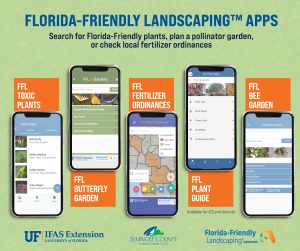January 20 is Arbor Day in Florida, and this Friday, Extension offices throughout the state will be hosting tree planting workshops and tree giveaways. Florida gets a jump on national arbor day, which isn’t until April, because this is the time of year when young trees are easiest to transplant in our warmer climate. As with every new thing we plant, timing is key.
There are many benefits to planting trees in our backyards, neighborhoods and cities. They clean the air, filter storm water, support wildlife, store carbon, reduce heat and provide a wealth of human benefits—relaxing under the shade of a tree is a balm for any kind of stress.
Most of all, planting a tree is an investment in the future. Trees have very long lifespans, from the southern magnolia, which will grow for 80-100 years, to bald cypress, which can live to be 1,800 years old. There’s a Chinese proverb that says, “The best time to plant a tree was 20 years ago. The second-best time is now.”
When you plant a tree, you’re doing something that will affect your environment for decades or even generations to come. With that in mind, there are several things to consider when planting a new tree.
Right plant, right place
Florida is a big state, with a variety of climates and soil types, and what grows well in Ft. Myers might not thrive in Tallahassee. Finding the right plant for the right place is the first principle of our Florida-Friendly LandscapingTM program. Select trees that grow well in the USDA plant hardiness zone where you live. You can also increase your tree’s chances of success by carefully noting water drainage and the areas of sun and shade on your site. The FFL Plant Guide is a handy app for mobile devices and web browsers that can help you easily select plants by zone and yard conditions.
Avoid invasive species
The last thing you need is a tree that grows out of control and takes over the native landscape. Invasive tree species, such as Brazilian pepper (Schinus terebinthifolius) and mimosa (Albizia julibrissin) have done just that in Florida, displacing native plant communities and disrupting the ecology of natural areas. Yet invasive species are still sometimes sold at nurseries and home garden centers. The Florida Invasive Species Council and the UF/IFAS Center for Aquatic and Invasive Plants maintain lists of plants that are considered invasive in your area of Florida. UF/IFAS Extension horticulture agents and Florida Master Gardener volunteers will also be able to guide you in choosing native and non-invasive plants for your landscape.
Allow room to grow
When picking out a site for planting your tree, it’s important to picture how it will grow above and below the ground, with overarching branches and a root system that extends far from the trunk. Give your new tree plenty of room to grow, and plant far away from structures, utility and telephone lines, irrigation pipes and other obstructions. If you’re unsure where your underground utility lines lie, call 811 before you dig.
Choose storm-resistant trees
Severe storms are a fact of life in Florida, and the tree that’s tall and majestic on a sunny day can become a source of anxiety when hurricane winds are blowing. While there’s no such thing as a wind-proof tree, some trees are more storm-resilient than others. In many parts of Florida, bald cypress, sand live oak, magnolia, dahoon holly, and crape myrtles are particularly wind-resistant. If palms are your thing, try pindo palms, date palms, pygmy date palms, arecas, Canary Island Date palms or sabal palms. Regardless of what kinds of trees you have, it’s a good idea to trim old and dying branches in advance of hurricane season.
This Arbor Day, I hope you’ll visit your local UF/IFAS Extension office to learn how to plant and care for a new tree. With planning and care, the simple act of planting a tree may bring joy and comfort to you and to others for generations to come.
by Andra Johnson
Source: UF/IFAS Pest Alert
Note: All images and contents are the property of UF/IFAS.




